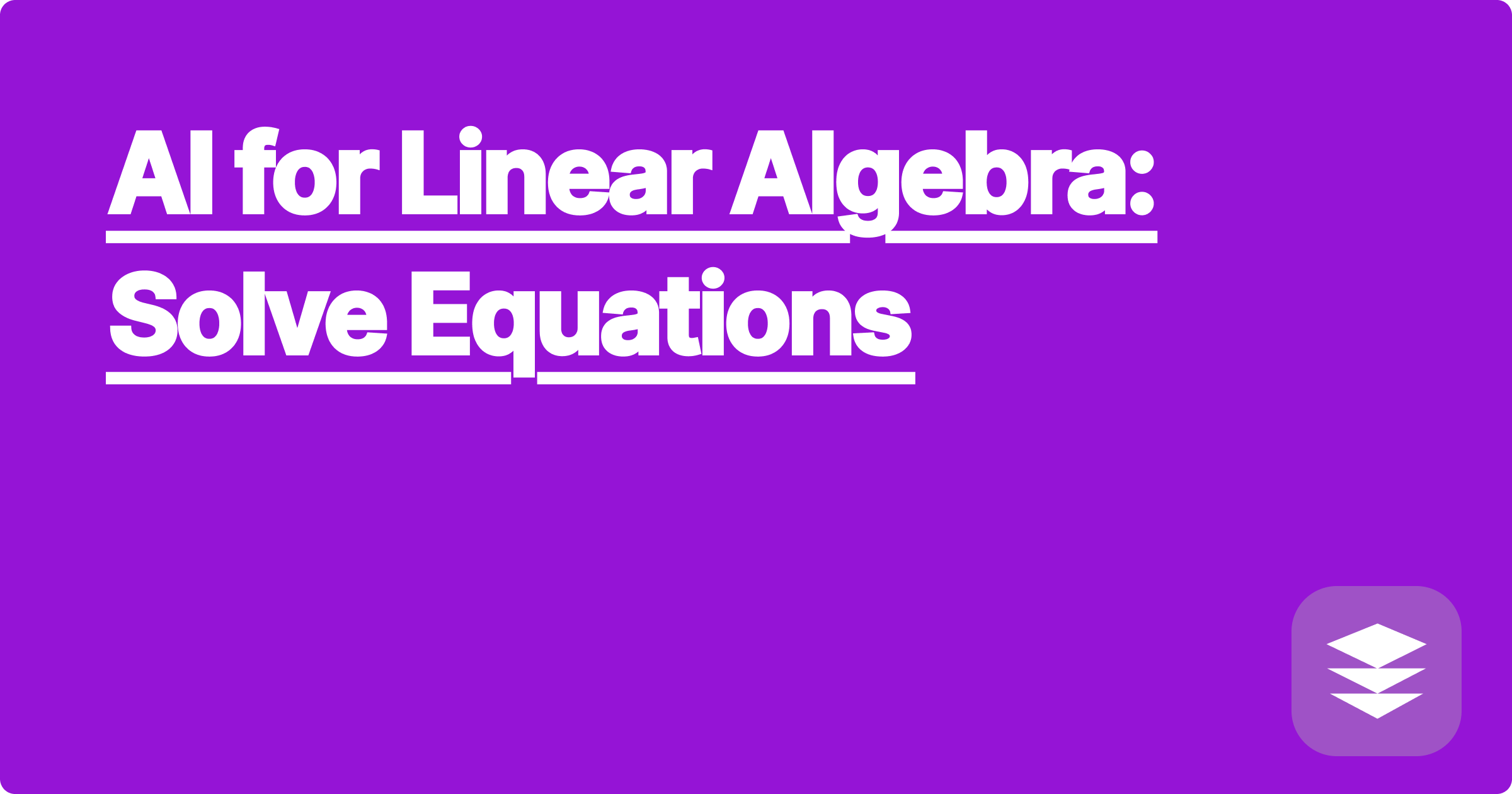
Juggling complex concepts, demanding coursework, and time-consuming research is a constant challenge for STEM students. Linear algebra, with its intricate matrices and equations, often presents a significant hurdle. However, the rise of Artificial Intelligence offers a powerful new toolkit to conquer these challenges and unlock a new level of academic success. Imagine having a personalized AI tutor available 24/7, capable of guiding you through complex problems, providing instant feedback, and even helping you brainstorm research ideas. This isn't science fiction; it's the reality of AI-powered learning. This blog post explores how AI can transform your approach to linear algebra, specifically focusing on solving equations, and ultimately empower you to excel in your STEM journey.
For STEM students and researchers, mastering linear algebra is often crucial for success. It underpins many fields, from computer science and engineering to physics and economics. However, traditional learning methods can be time-consuming and may not cater to individual learning styles. This is where AI comes in. By leveraging cutting-edge AI tools, you can personalize your learning experience, accelerate your understanding of complex concepts, and significantly boost your research productivity. This blog post will delve into specific AI tools and techniques that can help you solve linear algebra equations efficiently, understand the underlying concepts more effectively, and ultimately free up valuable time for other academic pursuits.
Linear algebra involves the study of vectors, vector spaces, linear transformations, and systems of linear equations. These concepts are fundamental to many STEM fields. Solving systems of linear equations, in particular, is a common task, often involving Gaussian elimination, matrix inversion, or eigenvalue decomposition. These methods can be computationally intensive and prone to errors, especially when dealing with large matrices. Furthermore, simply finding the solution is often insufficient; understanding the underlying mathematical principles and their implications is crucial for applying linear algebra to real-world problems. This requires not just mechanical computation but also a deep conceptual grasp, which traditional methods often struggle to provide.
AI offers a transformative approach to solving linear algebra equations. Tools like Wolfram Alpha provide a powerful platform for solving complex equations, performing symbolic computations, and visualizing solutions. Simply input your system of equations, and Wolfram Alpha will not only provide the solution but also offer step-by-step explanations, helping you understand the process. Beyond Wolfram Alpha, specialized AI tools are emerging that cater specifically to mathematical problem-solving. These tools can often handle more complex equations and offer tailored explanations based on your current understanding.
Let's walk through an example using Wolfram Alpha. Suppose you need to solve the following system of equations: 2x + y = 5 and x - y = 1. Open Wolfram Alpha and enter "solve 2x + y = 5, x - y = 1". The engine will quickly compute the solution, x = 2 and y = 1. Additionally, it will often provide alternative solution methods, such as matrix methods or graphical representations, allowing you to explore different approaches and deepen your understanding. For more complex systems involving matrices, you can input the matrix directly into Wolfram Alpha or use dedicated linear algebra libraries in programming languages like Python, often enhanced with AI capabilities.
Consider a scenario in computer graphics where you need to perform 3D transformations. These transformations are represented by matrices, and manipulating these matrices involves solving systems of linear equations. AI tools can simplify these calculations, allowing you to focus on the creative aspects of graphics programming. Similarly, in machine learning, linear algebra is essential for tasks like linear regression and principal component analysis. AI-powered tools can automate the underlying linear algebra operations, allowing you to build and train models more efficiently.
Integrating AI into your learning workflow can significantly boost your academic performance. Consider using a Generalized Personal AI (GPAI) as a virtual study partner. A GPAI can help you schedule study sessions, track your progress, and even provide personalized feedback on your work. Imagine using your GPAI to create flashcards for key linear algebra concepts or to generate practice problems tailored to your weaknesses. Beyond GPAI, explore less common AI tools like Symbolab for step-by-step solutions and Mathway for detailed explanations. These tools can offer different perspectives and reinforce your understanding. Furthermore, use AI to manage your time effectively. By automating repetitive tasks like literature searches and data analysis, you can free up valuable time to focus on deeper learning and research.
By leveraging the power of AI, you can transform your approach to linear algebra and other STEM subjects. Don't just solve equations; understand them. Don't just learn; master. Embrace AI as your personalized learning companion, and unlock your full academic potential. Start exploring these tools today, experiment with different approaches, and discover the best way to integrate AI into your learning journey. The future of STEM learning is here, and it's powered by AI.
AI in Chem Eng: Optimize Lab Processes
AI for Calculus: Instant Problem Solving
AI Biology Tutor: Ace Your Exams
AI for Robotics: Design & Simulate
AI for Stats: Analyze Data Easily
AI in Computer Science: Learn to Code
AI for Materials Science: Discover
AI for Linear Algebra: Solve Equations